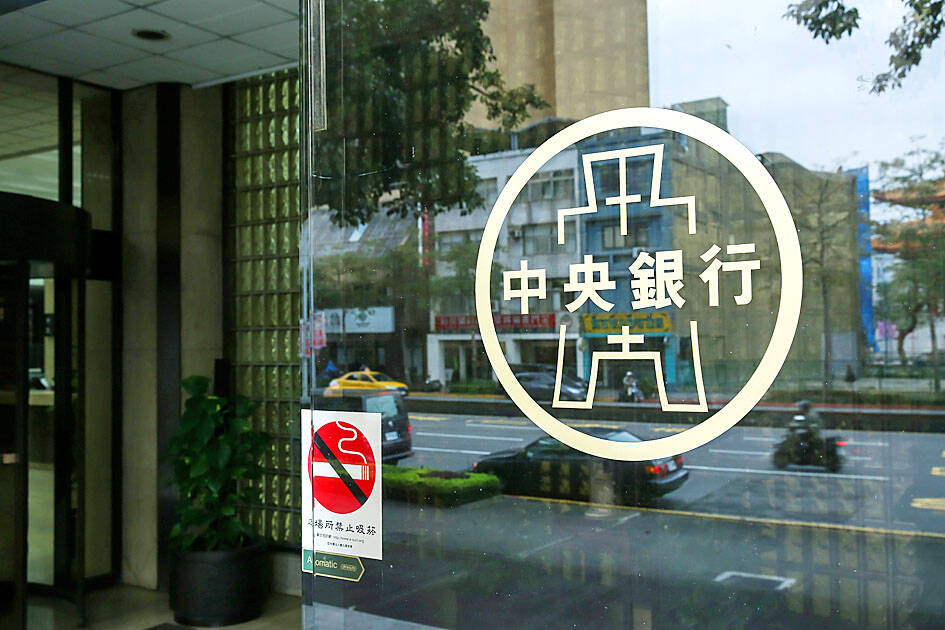The nation’s balance of payments last quarter recorded a current account surplus of US$23.39 billion, down US$8.84 billion from a year earlier, as trade surpluses declined after exports slid into contraction mode, the central bank said on Monday.
A global economic slowdown induced by high inflation and drastic monetary tightening played a significant role in the lackluster performance, the bank said.
Exports in the fourth quarter of last year shrank 8.6 percent from a year earlier, with the retreat in shipments to China being most evident, Ministry of Finance data showed.

Photo: Billy H.C. Kwok, Bloomberg
The balance of payments refers to the sum of all transactions with foreign entities by individuals, companies and government bodies. It is commonly used as a reference point for monetary policymaking.
Taiwanese exporters, which reaped a windfall during the COVID-19 pandemic, are now struggling with inventory corrections, as consumers worldwide cut spending on technology products. Taiwan is home to the world’s largest suppliers of electronics used in smartphones, notebook computers, wearables and TVs, among other applications.
The services account surplus narrowed by US$2.87 billion to US$1.13 billion, as sluggish demand for shipping services weighed on freight rates, the central bank said.
The financial account recorded a US$15.66 billion net capital outflow as local insurers raised their holdings of overseas assets and foreign portfolio managers increased their holdings of local shares, the central bank said.
It was the 50th consecutive quarter of net capital outflows.
It is common for export-focused nations such as Taiwan, China, South Korea and Germany to report fund outflows, as financial institutions pursue investment returns in markets around the world, the central bank said.
The fund movements occurred as local firms increased their investments in overseas markets to expand their footprint, while foreign companies deepened their presence in Taiwan, especially in the areas of green energy, wholesale and retail, and finance, the central bank said.
The balance of payments last year recorded a current account surplus of US$101.73 billion and the financial account registered an asset increase of US$98.1 billion, it said.

Semiconductor shares in China surged yesterday after Reuters reported the US had ordered chipmaking giant Taiwan Semiconductor Manufacturing Co (TSMC, 台積電) to halt shipments of advanced chips to Chinese customers, which investors believe could accelerate Beijing’s self-reliance efforts. TSMC yesterday started to suspend shipments of certain sophisticated chips to some Chinese clients after receiving a letter from the US Department of Commerce imposing export restrictions on those products, Reuters reported on Sunday, citing an unnamed source. The US imposed export restrictions on TSMC’s 7-nanometer or more advanced designs, Reuters reported. Investors figured that would encourage authorities to support China’s industry and bought shares

TECH WAR CONTINUES: The suspension of TSMC AI chips and GPUs would be a heavy blow to China’s chip designers and would affect its competitive edge Taiwan Semiconductor Manufacturing Co (TSMC, 台積電), the world’s biggest contract chipmaker, is reportedly to halt supply of artificial intelligence (AI) chips and graphics processing units (GPUs) made on 7-nanometer or more advanced process technologies from next week in order to comply with US Department of Commerce rules. TSMC has sent e-mails to its Chinese AI customers, informing them about the suspension starting on Monday, Chinese online news outlet Ijiwei.com (愛集微) reported yesterday. The US Department of Commerce has not formally unveiled further semiconductor measures against China yet. “TSMC does not comment on market rumors. TSMC is a law-abiding company and we are

FLEXIBLE: Taiwan can develop its own ground station equipment, and has highly competitive manufacturers and suppliers with diversified production, the MOEA said The Ministry of Economic Affairs (MOEA) yesterday disputed reports that suppliers to US-based Space Exploration Technologies Corp (SpaceX) had been asked to move production out of Taiwan. Reuters had reported on Tuesday last week that Elon Musk-owned SpaceX had asked their manufacturers to produce outside of Taiwan given geopolitical risks and that at least one Taiwanese supplier had been pushed to relocate production to Vietnam. SpaceX’s requests place a renewed focus on the contentious relationship Musk has had with Taiwan, especially after he said last year that Taiwan is an “integral part” of China, sparking sharp criticism from Taiwanese authorities. The ministry said

US President Joe Biden’s administration is racing to complete CHIPS and Science Act agreements with companies such as Intel Corp and Samsung Electronics Co, aiming to shore up one of its signature initiatives before US president-elect Donald Trump enters the White House. The US Department of Commerce has allocated more than 90 percent of the US$39 billion in grants under the act, a landmark law enacted in 2022 designed to rebuild the domestic chip industry. However, the agency has only announced one binding agreement so far. The next two months would prove critical for more than 20 companies still in the process